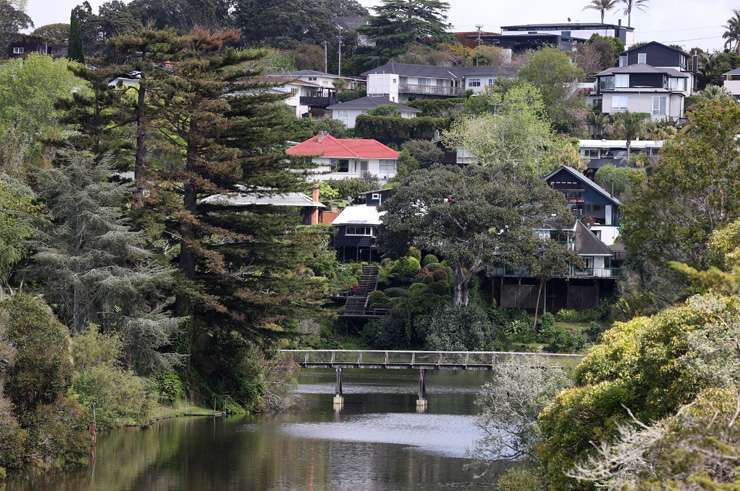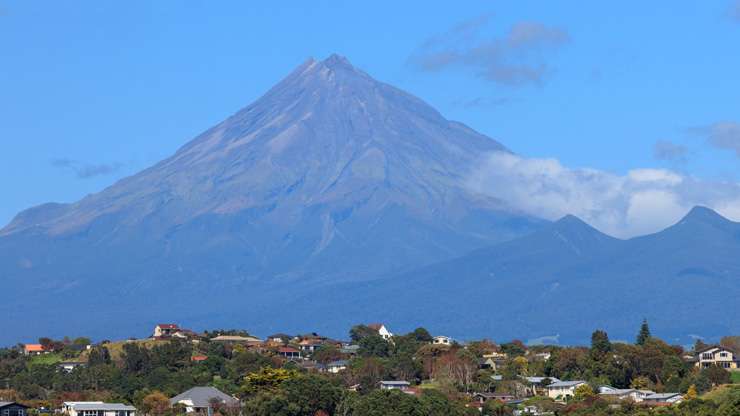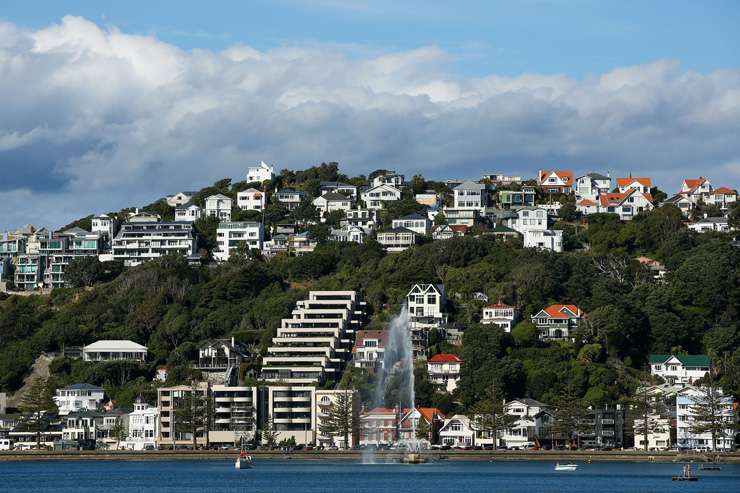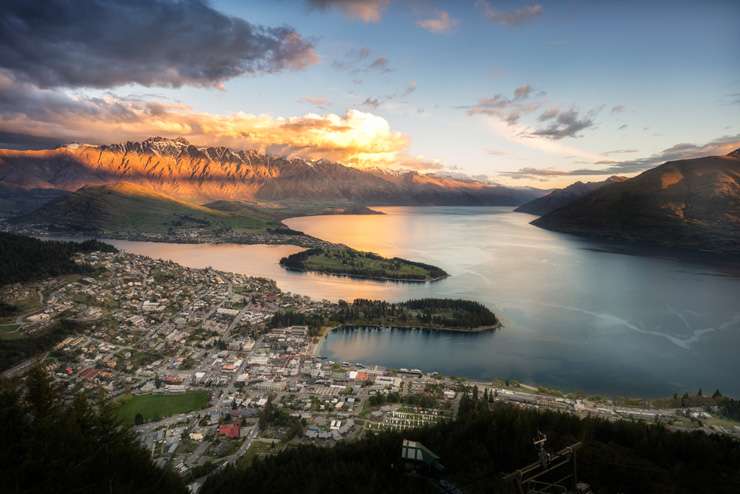Click here to download this report >
Property values are tumbling across the country, with house prices in most of New Zealand's major cities suffering sharp falls.
The latest figures from the OneRoof-Valocity House Value Index show steep declines in Auckland, Dunedin, Hamilton, Tauranga and Wellington.
Start your property search
Nationwide, the average property value slid 0.9% ($10,000) to $1.087 million, as rising interest rates, cost of living pressures and tighter credit conditions kept buyers out of the market.
Auckland's average property value fell 2.2% ($34,000) in the three months to the end of May to $1.53m - the city's third consecutive quarter-on-quarter decline.
Greater Wellington fell harder over the same period. The 2.9% drop in the region's average property value, to $1.104m, pushed house prices back to November levels.
Four other regions - Manawatu-Whanganui, Hawke's Bay, Nelson and Waikato - suffered declines in their average property value over the last three months but homeowners across the rest of the country saw little in the way of value growth.
The country's best-performing region was Canterbury, but quarterly growth of 1.9% was well below the 2.9% it recorded in the three months to the end of April and the 3.2% recorded in the three months to the end of March.
The slowdown was also evident in Northland, which had been, for much of this year, the country's strongest housing market. Value growth in the region dropped from 5.8% in the three months to the end of April to 1.4% in the three months to the end of May.
Of New Zealand's seven major metros, just two - Christchurch and Queenstown - recorded value growth over the quarter. Hamilton suffered the steepest decline, with its average property value falling 4.1% ($38,000) to just below $900,000 in the three months to the end of May.
All but two of the city's suburbs with 20 or more settled sales in the last 12 months suffered value drops. More worrying is the fact that house prices in three Hamilton suburbs - Flagstaff, Rototuna North, Hamilton East - are now below November levels.
Dunedin's average property value didn't fall as hard - it was down 2.5% ($19,000) to $738,000 - but the figures showed no suburb there with 20 or more settled sales in the last 12 months recorded value growth in last three months, putting recent purchases at risk of falling into negative equity.
The capital's average property value fell 2.4% ($32,000) to $1.288m, with prices in 26 of the city's suburbs lower now than they were three months ago. Tauranga's average property dipped 0.2% ($2000) over the quarter to $1.237m, with 10 of the city's suburbs suffering negative growth over the period.

Valocity head valuations James Wilson says it's important to put the declines in context. Photo / Fiona Goodall
Twenty-eight of the country's 72 territorial local authorities suffered value declines over the quarter, with the biggest drops in Kaikoura and Upper Hutt - the average property value in both fell 6%. Eleven TAs were also worse off now than they were six months ago, although New Zealand's average property value is still up 13.8% on this time last year and almost 40% up on June 2020.
James Wilson, head of valuations at OneRoof's data partner, Valocity, said: "Weaker market conditions are now evident across much of the country and across many property types. FOMO is most definitely gone, replaced by FOOP – fear of overpaying.
"Interest rates again are playing a key role in value movements. The cut to interest rates and removal of credit barriers drove a lot of house price growth in the months after the first Covid lockdown. Now rising interest rates and a credit squeeze have pushed values the other way.
"What's clear now, though, is the growing influence of interest rates on the market, with credit rules less of a factor in people's buying decisions. Throughout the summer period buyers were frustrated by how much they were allowed to borrow as a result of the CCCFA, but they are now more likely to be worried about their ability to pay back their debt on higher interest rates. It's likely, in this environment, that the flagged reversal on the CCCFA changes will have a much lower impact on buying activity."
Wilson said it was important to put the value declines in context. “Many of the areas in trouble now experienced significant growth over the past 12 to 18 months, and even with prices falling are likely to be still well ahead of where they were two years ago.”
Of the 984 suburbs and towns that registered 20 or more sales in the last 12 months, 488 suffered declines in their average property value, with total lost over the last three months coming in at $15.5m. The biggest drop was in Chatswood, in Auckland's North Shore. The suburb's average property value fell 8.1% ($153,000) to $1.725m over the quarter and 2.65% over the last six months.
House prices in a further 123 suburbs were below November levels, while house prices in four suburbs - Auckland Central, Meremere, Oriental Bay, Newmarket - were cheaper now than they were 12 months ago.
OneRoof editor Owen Vaughan said the figures pointed to further declines. "The biggest concern for those who bought at market peak is whether or not their property is worth less than what they paid for it," he said.
"For those who plan to be in their home for a long period and can repay their mortgage, negative equity won't be a pressing issue, but rising interest rates and cost of living pressures will put the squeeze on homeowners and the safety valve of being able to sell in a rising market is no longer there."
Mortgage registration volumes have failed to recover from the double blow of rising interest rates and tighter lending conditions. First-home buyers' share of the market has fallen from 39% in the last quarter of 2021 to 37% in the first quarter of this year. The outlook for the second quarter looks grim, with the actual number of registrations for April and May just over 3000, compared to the more than 7000 in the first three months of this year and the more than 10,000 in the last three months of 2021.
Investors' share of purchases has hovered around the 24% mark, but actual numbers reflect an overall withdrawal from the market, with total investor mortgage registrations so far this quarter just over 2000, compared to 5000 in the first quarter and more than 6000 in the final quarter of 2021.
Wayne Shum, head of research at Valocity, said the registration figures pointed to further challenges in the market. "Refinancing rose in 2020 and 2021 as homeowners took advantage of record-low mortgage rates. But approximately 60% of mortgages will see their rates adjusted in the next 12 months, which will be a shock for those coming off record-low rates."
Shum added that sales volumes were also under pressure. "The number of settled sales hit a peak of 125,851 in 2020, but numbers fell to 108,149 in 2021, mostly due to lower stock levels but rising mortgage rates, the credit squeeze and changes to tax policy for investors have had an impact, and these factors are likely to push sales volumes down further in 2022."
-----------
HOUSING MARKET AT A GLANCE*
New Zealand's average property value grew 13.9% ($132,000), in the last 12 months to $1.087m, but in the three months to the end of May it dropped 0.9% ($10,000). Canterbury was the hottest region over the quarter, with growth of 1.9% ($15,000) putting its average property value within spitting distance of $800,000. Hauraki, in Waikato, was the country's best-performing territorial local authority over the quarter, with its average property value up 8.7% to $878,000.
Most expensive: With an average property value of $4.135m, Herne Bay, in Auckland, is still New Zealand's most expensive residential suburb. While homes in the waterfront enclave are, on average, $433,000 more expensive now than they were 12 months ago, the market slowdown has had an impact on recent activity, with Herne Bay's average property value down 1.4% ($59,000) in the last three months. Its nearest competition is nearby Waiheke Island (up 2.7% over the quarter to $3.882m), while the most expensive suburb outside of Auckland is Queenstown-Lakes' Kawarau Falls (up 6.5% to $3.423m).
Fifty-nine suburbs with 20 or more settled sales in the last 12 months have an average property value of $2m-plus, down from 65 in the 12 months to the end of April and 71 in the 12 months to the end of March. Among those falling out of the $2m club are Roseneath, in Wellington (down 3.4% to $1.947m), and Meadowbank, in Auckland, (down 4.6% to $1.942m).

Meadowbank, in Auckland, fell out of the $2m club. Photo / Fiona Goodall
Cheapest: With an average property value of $229,000, Runanga, in Grey, is the best place to bag a bargain, and is likely to remain so, with house prices in the rural town falling 1.7% ($4000) in the last three months. The cheapest major metro suburb is South Dunedin, in Dunedin, where the average property value is $451,000, almost $200,000 below the average property value of Auckland's cheapest suburb, Auckland Central ($637,000). Wellington's cheapest suburb is Wellington Central ($668,000), while Christchurch's is Phillipstown ($462,000) and Hamilton's is Bader ($650,000). Entry-level in Tauranga and Queenstown is considerably higher, with Tauranga's cheapest suburb of Parkvale with an average property value of $769,000, and Queenstown-Lakes' cheapest suburb, Kingston, which has an average property value of $795,000.
The percentage of suburbs with an average property value of less than $500,000, and less than $1m, has remained steady over the last three months.
In demand: The beach community of Mahia, in Wairoa, Hawke's Bay, recorded the country's biggest three-month value growth. Its average property value rose 12.9% ($104,000) to $910,000. Just five suburbs saw their average property value grow by more than 10% in the last three months, down from 15 suburbs in the three months to the end of April and 31 in the three months to the end of March. Of the major metros, Christchurch Central, in Christchurch, enjoyed the strongest three-month growth, with its average property value up 7% ($47,000) to $723,000. The strongest performers in the other major metros were:
• Auckland - Waiuku, up 5.3% to $1.032m
• Dunedin - Sawyers Bay, up 0% to $731,000
• Hamilton - Fairfield, up 1.1% to $858,000
• Queenstown-Lakes - Lake Hayes, up 6.8% to $2.335m
• Tauranga - Papamoa, up 4.9% to $1.111m
• Wellington - Maupuia, up 4.2% to $1.191m
Biggest winner: Kawarau Falls, in Queenstown-Lakes, gained the most, dollar-wise, in the last three months. Its average property value jumped $208,000 (6.5%) to $3.423m. Nine more suburbs, mostly in high-value, waterfront locations, saw their average property value grow by more than $100,000 in the last three months, down from 29 in the three months to the end of April and 94 in the three months to the end of March. The biggest quarterly gains in the other major metros were:
• Auckland - Coatesville, up $151,000 to $3.707m.
• Christchurch - Cashmere, up $75,000 to $1.071m
• Dunedin - Sawyers Bay, up $0 to $731,000
• Hamilton - Fairfield, up $9000 to $858,000
• Tauranga - Papamoa, up $52,000 to $1.111m
• Wellington - Seatoun, up $51,000 to $2.275m
Biggest loser: The suburb that has suffered the most over the last three months is Chatswood, on Auckland's North Shore. Its average property value dropped 8.1% ($153,000) to $1.725m. The suburb that lost the most, in dollars, is Okura Bush, in Auckland's Rodney district. The mostly rural fringe suburb saw its average property value plunge $183,000 to $3.035m. Of the 984 suburbs with 20 or more settled sales in the last 12 months, just over 50% (498) saw zero or negative growth in the three months to the end of May. More worrying for some homeowners is the fact that property values in 124 suburbs are lower now than they were six months ago. And homeowners who bought 12 months ago in Oriental Bay, Auckland Central, Meremere and Newmarket, are likely to be in a negative equity situation, with the average property value in all four now between 1% and 2.9% lower than in May 2021.
The biggest metro fallers, in dollar terms, over the quarter were:
• Auckland - Okura Bush, down $183,000 to $3.035m
• Christchurch - Kennedys Bush, down $32,000 to $1.814m
• Dunedin - Roslyn, down $36,000 to $973,000
• Hamilton - Hamilton Lake, down $80,000 to $1.031m
• Queenstown-Lakes - Wanaka, down $54,000 to $2.04m
• Tauranga - Otumoetai, down $39,000 to $1.188m
• Wellington - Roseneath, down $69,000 to $1.947m
Low sales volumes are contributing to the value slide: in the 12 months to the end of May, the total number of settled sales was 108,238, down from 112,836 in the 12 months to the end of April. Just 984 suburbs recorded 20 or more sales during the period, down from 990 in the 12 months to the end of April, and 320 suburbs had no sales at all.
* Figures only cover suburbs with 20-plus settled sales in the last 12 months.
-----------
Northland's average property value has grown nearly 10% in the last six months and 22% in the last 12 months. The numbers look good at TA level, too. The last six months has added another $87,000 to the average property value in Whangarei, and more than $1m to the average property value in Kaipara. Even in the Far North, house values are $62,000 higher now than they were six months ago. But the value lift since November has been front-loaded, with all three TAs and the region as a whole recording declining growth levels in the last three months, and it is possible Northland's housing market will join the rest of the country in negative territory come July or August.
The downturn is likely to put the brakes on Whangarei's entry to the $1m club, with the last three months adding only $16,000 to the TA's average property value, which now sits at a tantalisingly close $976,000.
Of the 56 Northland suburbs that saw 20 or more sales in the last 12 months, 47 enjoyed house value growth in the three months to the end of May. The biggest jumps were in the Whangarei suburbs of Langs Beach (+8.3% to $2.422m), Tutukaka (+8% to $1.45m), Ngunguru (+7.4% to $1.211m) and Ruakaka (+7.2% to $1.078m). The biggest quarterly falls were all in Whangarei as well, but at the other end of the price spectrum: Horahora (-1.6% to $775,000), Avenues (-1.5% to $653,000) and Onerahi (-1.5% to $721,000).
-----------
Greater Auckland's average property value was the first to suffer negative growth this year, but despite a $34,000 fall in the last three months, it is still $15,000 above where it was six months ago. How long the average property value stays above November levels is unclear, but the trajectory suggests it will drop below $1.5m at some point this year.
Six of the region's seven former local government areas recorded negative growth over the last three months, with the North Shore suffering the most; its average property value fell 3.4% ($59,000) to $1.672m over the quarter. Auckland City's average property value fell 2.65% ($46,000) over the same period, while Manukau's decline of 2.1% was just below the region-wide fall of 2.2%.
Franklin's average property value was up 0.1% over the period, but it's likely prices there will fall too in the coming months.
Of the 222 Auckland suburbs that recorded 20 or more sales in the last 12 months, 82.8% dropped in value over the quarter. That's a significant increase in just the space of two months, with the percentage of suburbs with 20 or more sales that dropped over the three months to the end of March just 24%. Four suburbs - Chatswood, Murrays Bay, Maraetai and Onehunga - saw value declines of more than 7% over the quarter, and another 19, including Campbells Bay, Newmarket and Mount Eden, saw value declines of between 5% and 65% over the same period. The strongest performers were Waiuku (+5.3%), Point Wells (+4.5%) and Coatesville (+4.2%).
-----------
A 4.1% drop in Hamilton's average property value in the last three months was enough to drag the region into negative growth territory. Waikato's average property value slid 0.2% to $986,000, putting a dampener on the region crossing the $1m threshold anytime soon.
Hamilton was Waikato's biggest loser over the quarter but other TAs are starting to feel the squeeze, with Waikato TA and Waitomo recording value drops of 0.5% and 0.4% respectively and Matamata-Piako and South Waikato barely growing at all.
Strong growth in Thames-Coromandel (+3%) and Taupo (+3.1%) and stellar growth of 8.7% in Hauraki kept the region from suffering a steeper decline, but the performance of these TAs highlights that Waikato is a collection of very different markets, which often have no relation to or bearing on each other. Hamilton's plunge has largely been driven by the factors affecting other major metros - high interest rates, more stock on the market - and has seen drop-offs in activity in the developer and land-banking market.
Value lifts in Thames-Coromandel, Taupo and Hauraki have largely been driven by stronger than usual activity in the holiday home and coastal markets over the summer and early autumn periods, although two of Waikato's best-performing locations over the quarter - Kerepehi (+10.3%) and Ngatea (+8%) - are landlocked relatively affordable small towns in the Hauraki Plains.
Hamilton is home to the majority of Waikato's "declining" suburbs, with Bader and Hamilton Lake recording the steepest falls over the quarter - 7.8% and 7.2% respectively. The housing market in Meremere, 58km north of Hamilton, suffered the double blow of a 5% value decline over the quarter and 2.4% value decline over the last 12 months. It is one of four New Zealand suburbs where the average property value is lower now than it was in June 2021.
-----------
House price growth in the Bay of Plenty slowed to 1.1% in the last three months, but the region's average property value of $1.087m is still up 18.1% ($166,000) year on year.
Keeping the region out of negative territory is Rotorua, where value growth over the quarter was 5.6%, up from the 4.4% recorded in the three months to the end of April. The city's average property value is now $2 shy of hitting $800,000, almost double what it was five years ago.
Ōpōtiki is bearing the brunt of the market slowdown in the region, with the average property value in the largely rural TA falling 2.4% ($15,000) to $617,000 in the last three months. Also feeling the squeeze is Tauranga, where the average property slid 0.2% to $1.237m over the same period. Growth in Whakatane, Western Bay of Plenty and Kawerau was positive, but at a rate of around 1%.
The value lift saw values in eight Rotorua suburbs with 20 or more settled sales in the last 12 months jump more than 5% over the quarter, with an 8.1% surge in Lynmore - the region's highest. The surge also pushed Lynmore's average property value across the $1m mark, making it Rotorua's first $1m metro suburb.
-----------
Manawatu-Whanganui and Hawke's Bay suffered drops in their average property value over the quarter, with Manawatu-Whanganui down 1.3% to $690,000 and Hawke's Bay down 1% to $921,000 (both are still up by more than 10% on June 2021, though).
At 1.7% and 0.3% respectively, value growth in Taranaki and Gisborne was still positive over the quarter, but it has slowed sharply from 3.4% and 1.8% recorded in the three months to the end of April. Taranaki's overall growth figure was buoyed by a 3.6% lift in Stratford, but the trend line for Taranaki and Gisborne is clear - both are likely to be in negative growth territory before the end of winter.
Palmerston North, Manawatu-Whanganui's biggest centre, saw its average property value drop 3.2% ($26,000) to $792,000 - its value six months ago. All but three of the city's suburbs dropped in value over the quarter (with the exceptions being suburbs on the rural fringe), which shows just how fast and brutal the housing market shift has been in New Zealand's cities. Whanganui's average property value fell 1.1% over the quarter to $607,000, and low sales in the city point to further declines.

Mt Taranaki looms over houses in New Plymouth. Photo / Getty Images
House prices in Hawke's Bay’s biggest housing markets were similarly challenged. Napier's average property value dropped 1.2% to $939,000 and Hastings' fell 1.5% to $994,000, pushing it out of the $1m club. High-value suburbs in both cities fell hardest, with Westshore's average property value down 3.1% ($40,000) to $1.232m and Havelock North's down 3.6% ($52,000) to $1.384m.
The central North Island did have some standout performers over the quarter: homeowners in Wairoa, in Hawke's Bay, enjoyed a 5.3% lift in the TA's average property value (from $469,000 to $494,000), while the average property value in Ruapehu was up 5% to $458,000. Both are among the cheapest housing markets in the country.
-----------
Greater Wellington's average property value dropped 2.9% ($33,000) over the quarter to $1.104m - just 0.27% above where it was six months ago and 9.7% above its tally in June 2021.
The region's overall performance is being dragged down by steep value declines in Upper Hutt (-6%) and Lower Hutt (-5.1%), but also drops in Porirua (-2.8%), Wellington (-2.4%) and Kapiti Coast (-2.2%).
South Wairarapa, Carterton and Masterton kept their heads above water, with value growth of just under 1%, but the outlook for all three isn't exactly positive.
Upper Hutt's average property value has dropped below $1m for the first time in six months, as has Lower Hutt's, and it's likely house prices in both TAs will drop below their June 2021 levels, of $908,000 and $930,000 respectively, over winter. No suburb in either TA saw value growth over the quarter.
House prices in Wellington are under pressure, with low sales volumes adding to the problems in the capital. More than half of the city's suburbs suffered value declines over the quarter, with a 3% drop pushing Ngauranga out of the $1m club and a 3.4% drop wiping $69,000 off the average property value in Roseneath.

In decline: Oriental Bay, in Wellington. Photo / Getty Images
The city's most expensive suburb, Oriental Bay, saw its average property value drop a mere 0.2% ($5000) to $2.657m, which is good news if the rate of decline levels off over the next few months. However, of concern for new homeowners in the suburb is the fact that the average property value there is 1.5% down on June 2021's figure, which could expose them to the risk of negative equity.
New homeowners in the city's cheapest suburb, Wellington Central, another apartment-heavy market, will be feeling happier. The suburb's average property value was up 4% ($48,000) over the quarter to $668,000.
-----------
The slowdown is evident across the top of the South Island, with Nelson, Tasman and West Coast recording negative or negligible value growth over the quarter. Marlborough's average property value was 1.4% over the period, but the energy in the region's property market is clearly fading - value growth was 2.8% in the months to the end of April and 3.2% in the three months to the end of March.
House prices in all four regions are ahead of June 2021 levels, and homeowners who bought a year ago are unlikely to be caught in a negative equity trap, but the slump will eat into those growth margins.
With an average property value of $393,000, West Coast remains the country's cheapest housing market. Value growth in the region's three TAs over the last three months was mixed, with Grey's average property value down 3% to $388,000, Westland's down 0.2% to $432,000 and Buller's up 4.5% to $371,000, keeping the region from entering negative growth territory over the quarter. It should be remembered that they have the lowest average property values of all 72 TAs, and that movements - down or up - are coming off a very low base.
-----------
House price inflation in Canterbury is slowing but the region's growth rate of 1.9% over the quarter was the country's strongest. For old and new homeowners in the region, the 24.1% lift in the average property value to $792,000 over the last 12 months will be a huge relief, especially when buyers elsewhere are worried about negative equity.
Seven of the region's nine TAs were up over the quarter, with Waimate and Hurunui enjoying value growth of 4% and above. Selwyn, the region's most expensive TA, added $25,000 to its average property value, taking it to $1.025m - almost double what it was five years ago.
Homeowners in Mackenzie and Kaikoura weren't so fortunate, with Mackenzie's average property value registering zero growth over the quarter and Kaikoura's average property value plunging 6% ($43,000) to $675,000.
Christchurch is the country's strongest performing major metro, with its average property value up 1.7% ($13,000) to $797,000. Unlike in Auckland, the city's auction market is still quite strong, driven by the fact the prices are considerably lower - a key factor in a rising interest rate environment. Christchurch Central and Cashmere enjoyed the biggest value lifts over the quarter. Christchurch Central's average property value was up 7% ($47,000) to $723,000 and Cashmere's was up 7% ($75,000) to $1.146m.
-----------
Otago's average property value barely grew over the last three months, rising just 0.3% ($3000) to $962,000. Growth in Southland was only slightly better, with the region's average property value up 0.9% ($5000) to $962,000. Property values in both regions are still 15% or so ahead of where they were 12 months ago, but it's likely they will be in negative growth territory by July.
On the watchlist in Otago is Dunedin, which saw its average property value drop 2.5% ($19,000) to $738,000 - only slightly above what it was six months ago.
More worrying for homeowners in the city is that no Dunedin suburb with 20 or more settled sales in the last 12 months recorded value growth over the quarter (the number of growth suburbs for the entire city, regardless of sales volumes, is 22).

The view over Queenstown. Photo / Getty Images
Otago's other major housing market, Queenstown-Lake, saw value growth of 1.2% over the last three months, down from 3.6% in the three months to the end of April and 9.6% in the three months to the end of March. The TA's average property value is still a high $1.869m and 22% ($339,000) ahead of where it was 12 months ago.
Value growth in Southland's biggest market, Invercargill, was a negligible 0.6% over the last three months, with the city's average property value sitting at $530,000. The region's other two TAs, Southland and Gore, recorded value lifts of 1.6% over the same period, but the growth rate for both is slowing.


















































































